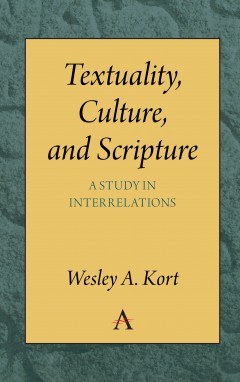Textuality, Culture and Scripture
A Study in Interrelations
By Wesley A. Kort
- About This Book
- Reviews
- Author Information
- Series
- Table of Contents
- Links
- Podcasts
About This Book
“Textuality, Culture and Scripture,” a study of the necessary and close relations between the three concepts, puts forward three main arguments. The first is that Western modernity retained the necessary role of texts and textuality in culture well into the twentieth century, although decreasingly so, until their role was increasingly displaced by materialist assumptions and theories. Taking as its starting point the so-called textual turn in cultural theory, the first argument is for the necessary role of textuality in understandings of culture.
The second argument is that textuaity is necessary in and for cultural, group and personal identities and that the texts of primary importance for identity can be related to what is generally thought of as “scripture.” It moves on to posit “scripture,” so understood, as a necessary category in an adequate textual theory and relates textuality and “scripture” to identity, primarily in terms of the potentials of texts for relating constancy and change to one another.
The third argument is that the Bible has been and continues to be for so many people their “scripture” because it provides what people, groups and, at times, also cultures need to have as identity or an adequate worldview, especially the relation created by biblical texts between stability or constancy and change or disruption. The book concludes with the proposal that textual locations or identities can be evaluated for whether or not they provide ways by which past and future, tradition and innovation, or constancy and change are related to one another.
Reviews
“Textuality, Culture, and Scripture integrates and extends Wesley Kort’s scholarly project of formulating a program in the literary study of religion that is at once resonant with and critical of late modernity. On display per usual are Kort’s special combination of theoretical sophistication and close textual reading, in the service here of what is his most impressive statement to date of the innate multivalence of the idea of the ‘text’ and the consequent intersectionality of ‘the sacred’ and ‘the secular.’”
—Richard A. Rosengarten, Associate Professor of Religion and Literature, University of Chicago Divinity School, USA
Author Information
Wesley A. Kort taught in the Department of Religion at Princeton University before he joined the faculty of the Department of Religion and the Graduate Program of Religion at Duke University where he served until becoming professor emeritus of religion in 2014. He is the author of 11 books and many scholarly articles in books and journals that relate religious, literary, and cultural studies to one another.
Series
Table of Contents
Introduction; 1. The Rise of a Materialist Culture; 2. Culture and Textuality; 3. “Scripture” as a Necessary Category in an Adequate Textual Theory; 4. “Scripture” and the Bible; 5. Reading the Bible as “Scripture”; Conclusion; Index.
Links
Stay Updated
Information
Latest Tweets



